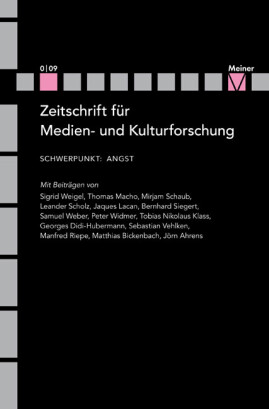
ZEITSCHRIFTENHEFT
Bd. 0 (2009), Heft 1: ZMK Zeitschrift für Medien- und Kulturforschung 0/2009: Angst
Herausgeber:
Zeitschrift für Medien- und Kulturforschung, Bd. 0
(2009)
In diesem Heft

Posthuman Conditions
Kultur- und Medienwissenschaften als dritte WissenskulturZeitschrift für Medien- und Kulturforschung, Bd. 0 (2009), Heft 1 : S. 12–18

Mit lachendem Gesicht: en face le pire jusqu'à ce qu'il fasse rire
Zeitschrift für Medien- und Kulturforschung, Bd. 0 (2009), Heft 1 : S. 20–37

Gespenster als Vorboten des Elektrischen
Wie ein Gelehrtenstreit im 18. Jahrhundert einen Anfangsgrund von Kulturwissenschaft stiftetZeitschrift für Medien- und Kulturforschung, Bd. 0 (2009), Heft 1 : S. 38–53

Hegels symbolisches Papier
Zum medialen Status des DingsZeitschrift für Medien- und Kulturforschung, Bd. 0 (2009), Heft 1 : S. 54–61

Das Seminar. Buch X. Die Angst (Auszug)
Zeitschrift für Medien- und Kulturforschung, Bd. 0 (2009), Heft 1 : S. 62–66

Anxiety
Borderlines in/of PsychoanalysisZeitschrift für Medien- und Kulturforschung, Bd. 0 (2009), Heft 1 : S. 74–86

Angst und Begehren
Zeitschrift für Medien- und Kulturforschung, Bd. 0 (2009), Heft 1 : S. 88–102

Schreckensgespenster
Überlegungen zur politischen Theologie der Angst nach Kierkegaard, Heidegger und HobbesZeitschrift für Medien- und Kulturforschung, Bd. 0 (2009), Heft 1 : S. 104–119

Abgioia. Tanz der Angst und des Konflikts
Zeitschrift für Medien- und Kulturforschung, Bd. 0 (2009), Heft 1 : S. 120–132

Angsthasen
Schwärme als Transformationsungestalten zwischen Tierpsychologie und BewegungsphysikZeitschrift für Medien- und Kulturforschung, Bd. 0 (2009), Heft 1 : S. 134–150

Der unmögliche Blick
Medientechnik und inszenierte Weiblichkeit in Michael Powells PEEPING TOMZeitschrift für Medien- und Kulturforschung, Bd. 0 (2009), Heft 1 : S. 152–166

Terror nicht Horror
Die Technologie der Angst und ihre Mediengeschichte in RINGZeitschrift für Medien- und Kulturforschung, Bd. 0 (2009), Heft 1 : S. 168–184

Der Mensch als Beute
Narrationen anthropologischer Angst im Science-Fiction-FilmZeitschrift für Medien- und Kulturforschung, Bd. 0 (2009), Heft 1 : S. 186–200


 Powered by CloudPublish
Powered by CloudPublish